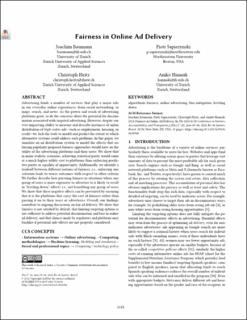Please use this identifier to cite or link to this item:
https://doi.org/10.21256/zhaw-30871Full metadata record
| DC Field | Value | Language |
|---|---|---|
| dc.contributor.author | Baumann, Joachim | - |
| dc.contributor.author | Sapiezynski, Piotr | - |
| dc.contributor.author | Heitz, Christoph | - |
| dc.contributor.author | Hannák, Anikó | - |
| dc.date.accessioned | 2024-06-21T08:30:59Z | - |
| dc.date.available | 2024-06-21T08:30:59Z | - |
| dc.date.issued | 2024-06 | - |
| dc.identifier.isbn | 979-8-4007-0450-5 | de_CH |
| dc.identifier.uri | https://digitalcollection.zhaw.ch/handle/11475/30871 | - |
| dc.description.abstract | Advertising funds a number of services that play a major role in our everyday online experiences, from social networking, to maps, search, and news. As the power and reach of advertising platforms grow, so do the concerns about the potential for discrimination associated with targeted advertising. However, despite our ever-improving ability to measure and describe instances of unfair distribution of high-stakes ads—such as employment, housing, or credit—we lack the tools to model and predict the extent to which alternative systems could address such problems. In this paper, we simulate an ad distribution system to model the effects that enforcing popularly proposed fairness approaches would have on the utility of the advertising platforms and their users. We show that in many realistic scenarios, achieving statistical parity would come at a much higher utility cost to platforms than enforcing predictive parity or equality of opportunity. Additionally, we identify a tradeoff between different notions of fairness, i.e., enforcing one criterion leads to worse outcomes with respect to other criteria. We further describe how pursuing fairness in situations where one group of users is more expensive to advertise to is likely to result in “leveling down” effects, i.e., not benefiting any group of users. We show that these negative effects can be prevented by ensuring that it is the platforms that carry the cost of fairness rather than passing it on to their users or advertisers. Overall, our findings contribute to ongoing discussions on fair ad delivery. We show that fairness is not satisfied by default, that limiting targeting options is not sufficient to address potential discrimination and bias in online ad delivery, and that choices made by regulators and platforms may backfire if potential side-effects are not properly considered. | de_CH |
| dc.language.iso | en | de_CH |
| dc.publisher | Association for Computing Machinery | de_CH |
| dc.rights | https://creativecommons.org/licenses/by/4.0/ | de_CH |
| dc.subject | Algorithmic fairness | de_CH |
| dc.subject | Responsible AI | de_CH |
| dc.subject | Social network | de_CH |
| dc.subject | Social computing | de_CH |
| dc.subject.ddc | 006: Spezielle Computerverfahren | de_CH |
| dc.subject.ddc | 170: Ethik | de_CH |
| dc.title | Fairness in online ad delivery | de_CH |
| dc.type | Konferenz: Paper | de_CH |
| dcterms.type | Text | de_CH |
| zhaw.departement | School of Engineering | de_CH |
| zhaw.organisationalunit | Institut für Datenanalyse und Prozessdesign (IDP) | de_CH |
| dc.identifier.doi | 10.1145/3630106.3658980 | de_CH |
| dc.identifier.doi | 10.21256/zhaw-30871 | - |
| zhaw.conference.details | 7th ACM Conference on Fairness, Accountability, and Transparency (FAccT), Rio de Janeiro, Brazil, 3-6 June 2024 | de_CH |
| zhaw.funding.eu | No | de_CH |
| zhaw.originated.zhaw | Yes | de_CH |
| zhaw.pages.end | 1432 | de_CH |
| zhaw.pages.start | 1418 | de_CH |
| zhaw.publication.status | publishedVersion | de_CH |
| zhaw.publication.review | Peer review (Publikation) | de_CH |
| zhaw.title.proceedings | Proceedings of the 2024 ACM Conference on Fairness, Accountability, and Transparency | de_CH |
| zhaw.funding.snf | 187473 | de_CH |
| zhaw.funding.zhaw | Socially acceptable AI and fairness trade-offs in predictive analytics | de_CH |
| zhaw.author.additional | No | de_CH |
| zhaw.display.portrait | Yes | de_CH |
| Appears in collections: | Publikationen School of Engineering | |
Files in This Item:
| File | Description | Size | Format | |
|---|---|---|---|---|
| 2024_Baumann-etal_Fairness-in-online-ad-delivery.pdf | 523.22 kB | Adobe PDF |  View/Open |
Show simple item record
Baumann, J., Sapiezynski, P., Heitz, C., & Hannák, A. (2024). Fairness in online ad delivery [Conference paper]. Proceedings of the 2024 ACM Conference on Fairness, Accountability, and Transparency, 1418–1432. https://doi.org/10.1145/3630106.3658980
Baumann, J. et al. (2024) ‘Fairness in online ad delivery’, in Proceedings of the 2024 ACM Conference on Fairness, Accountability, and Transparency. Association for Computing Machinery, pp. 1418–1432. Available at: https://doi.org/10.1145/3630106.3658980.
J. Baumann, P. Sapiezynski, C. Heitz, and A. Hannák, “Fairness in online ad delivery,” in Proceedings of the 2024 ACM Conference on Fairness, Accountability, and Transparency, Jun. 2024, pp. 1418–1432. doi: 10.1145/3630106.3658980.
BAUMANN, Joachim, Piotr SAPIEZYNSKI, Christoph HEITZ und Anikó HANNÁK, 2024. Fairness in online ad delivery. In: Proceedings of the 2024 ACM Conference on Fairness, Accountability, and Transparency. Conference paper. Association for Computing Machinery. Juni 2024. S. 1418–1432. ISBN 979-8-4007-0450-5
Baumann, Joachim, Piotr Sapiezynski, Christoph Heitz, and Anikó Hannák. 2024. “Fairness in Online Ad Delivery.” Conference paper. In Proceedings of the 2024 ACM Conference on Fairness, Accountability, and Transparency, 1418–32. Association for Computing Machinery. https://doi.org/10.1145/3630106.3658980.
Baumann, Joachim, et al. “Fairness in Online Ad Delivery.” Proceedings of the 2024 ACM Conference on Fairness, Accountability, and Transparency, Association for Computing Machinery, 2024, pp. 1418–32, https://doi.org/10.1145/3630106.3658980.
Items in DSpace are protected by copyright, with all rights reserved, unless otherwise indicated.